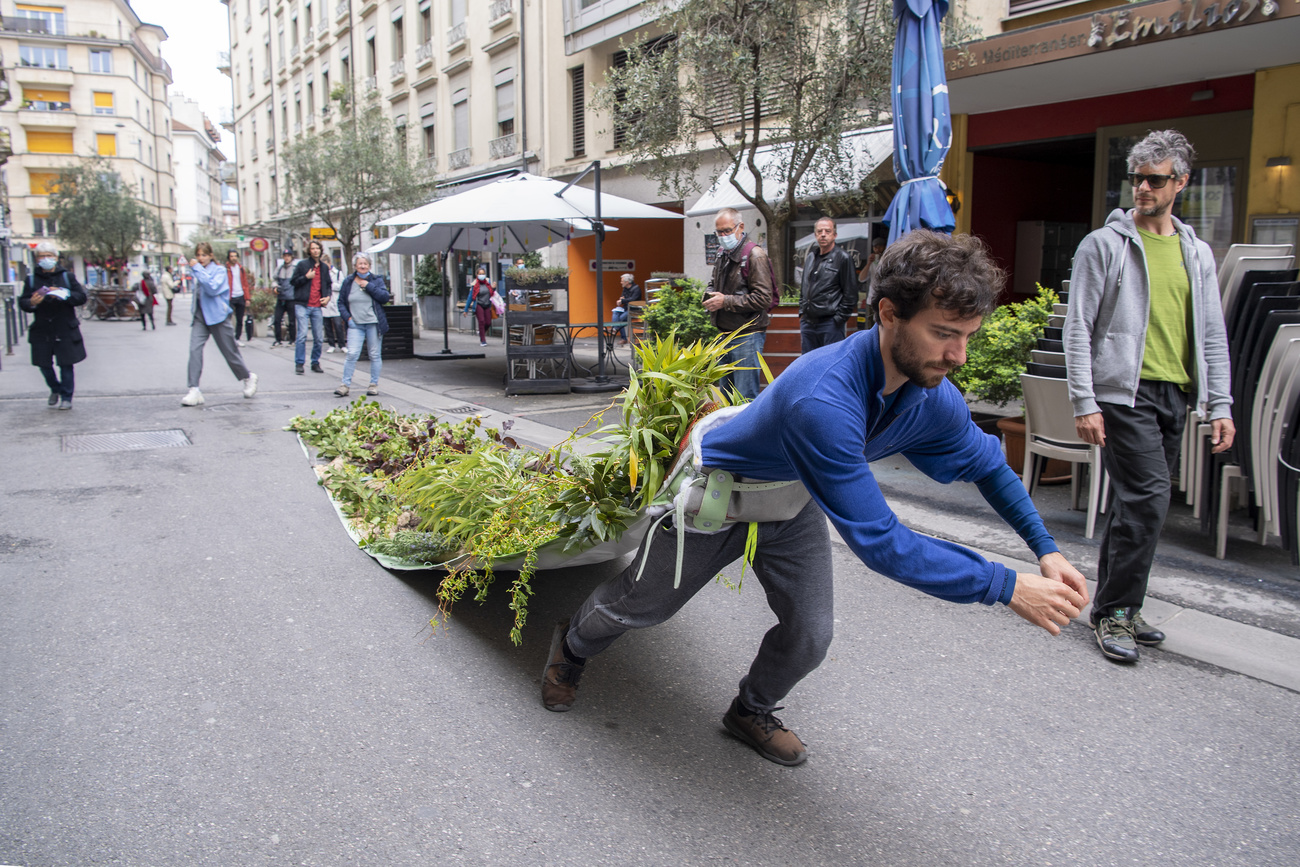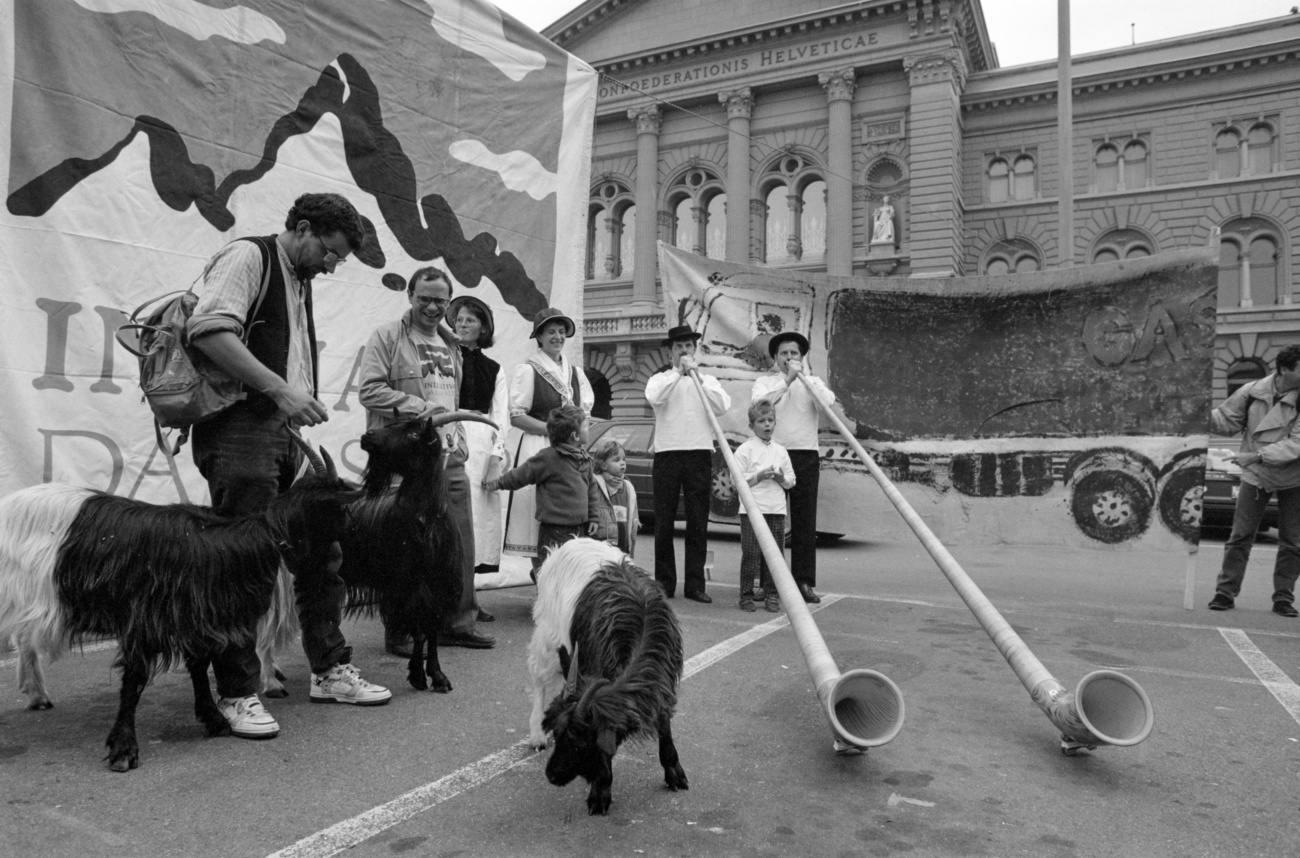
Freedom of expression at the ballot box: the Swiss case

How do popular votes contribute to promoting the freedom of expression? What role does modern direct democracy play in ensuring citizens are heard? The Swiss experience offers various lessons.
Switzerland’s modern history is peppered with some 700 nationwide votes which have either challenged existing law or proposed changes to the country’s constitution.
Official statistics record 455 citizens’ initiatives and about 240 popular referendums having made it to the ballot box. That’s not to mention the countless other attempts which ended up as damp squibs, with campaigners failing to collect the necessary signatures.
The sheer number might lead you to believe that the country deserves its reputation as a champion of citizens’ participation and a haven for freedom of expression.
Perhaps even more so, since the vote agenda covers issues with a major impact on society, politics and the economy as well as seemingly less pressing problems like daylight saving time, an unconditional basic income and cow horns.
It may also come as no surprise that Swiss citizens last month were the first voters worldwide to have a say on a law defining financial support to companies, institutions and individuals to offset the negative impact of government restrictions around Covid-19.
SWI #freedomofexpression series
In principle everything should be crystal clear: articles 19 of both the Universal Declaration of Human Rights (1948) and the UN Covenant on Civil and Political Rights (1966) stipulate that “everyone shall have the right to freedom of expression; this right shall include freedom to seek, receive and impart information and ideas of all kinds, regardless of frontiers, either orally, in writing or in print, in the form of art, or through any other media of his choice.” In Europe, the European Convention on Human Rights (1950) confirms freedom of expression as a legally binding right (article 10). Switzerland enshrines this fundamental freedom in article 16 of its 1999 constitution.
In practice, however, much remains contested. Many governments around the world are not protecting the right to freedom of expression but are increasingly undermining it. In other parts of the world, individuals and groups brandish the term “freedom of expression” to justify discriminatory and hateful speech. But although it is a universal right, freedom of expression is not an absolute right. Ensuring it and applying it is always a tightrope walk.
In a new SWI swissinfo.ch series we address these various aspects, challenges, opinions, and developments around freedom of expression, both in Switzerland and around the world. We provide a platform for citizens to express themselves on the issue, offer analysis by renowned scholars and highlight developments locally and globally. And, naturally, readers are invited to join the conversation later this spring and to make their voices heard.
The vote was slightly unusual because the law in question is due to expire at the end of this year. And many opponents considered it an opportunity to protest against the government’s anti-Covid policy measures more generally, including vaccinations and the extra powers taken on by the national authorities. In the end, 60,2% of the voters approved the law.
Explicit and implied
Over the past 173 years Switzerland only voted twice to explicitly define the “limits” of free expression: in 1994, when citizens endorsed anti-racism legislation, and in 2020, when they approved a ban on discrimination based on sexual orientation.
In a broader sense however, restrictions on freedom of speech were an issue in many more votes throughout Swiss history. This list includes ballots about the rights of religious minorities – both recently and back in the 19th century – censorship in the 1930s and restrictions for public service broadcasters, to mention just a few.
Marc Bühlmann, a political scientist at the University of Bern and the director of Année Politique SuisseExternal link, a platform on Swiss politics, says freedom of expression as an issue is implied in dozens of cases.
“It may not explicitly be the main focus of a vote, but possibly part of a larger discussion about basic rights,” says Bühlmann.
He mentions discussions about limitations on extra-parliamentary committees and the role of the government in campaigns, and the content of the official vote information booklet.
And in September, voters will have the final say on a law introducing same-sex marriage in Switzerland, after a committee of right-wing and conservative politicians successfully challenged a parliamentary decision to a nationwide ballot.
It is a topic that was also on the political agenda in Mexico (at a local or provincial levels), the United States (for a tribe of Native Americans), in Northern Ireland as well as in the central American state of Costa Rica over the past 18 months. The first nationwide same-sex marriage referendum took place in 2015, when 62% of Irish votersExternal link approved an amendment to the country’s constitution.
Platform and agenda setting
Other aspects to consider are the scope of initiatives and the arguments used in campaigns. Can anything be said? Can any issue be brought to a public vote without exception? And if not, who sets these limits?
Bühlmann points out that violations of personality rights and the protection of privacy are basically the only areas off-limits.
“Switzerland is very tolerant when it comes to citizens’ initiatives,” agrees Georg LutzExternal link, political scientist at the University of Lausanne and director of the Swiss Centre of Expertise in the Social Sciences.
“Except for restrictions based on anti-racism norms, almost anything is allowed,” he says, adding that there is a big ‘grey area’ – where it is not clear whether the demands or a specific campaign slogan is, or is not, conforming to standards.
Lutz notes that some groups, notably on the political right, have exhausted the possibilities of this liberal practice. He mentions two controversial initiatives brought to vote over the past decade where campaigners “openly appealed to Islamophobia”: the so called ‘minaret ban’ and the ‘burka ban’.
Lutz also stresses that to a large extents popular votes have become ‘launching pads’ for political groups to set the political agenda and to push their core themes.

Reality, Swiss style
But the Swiss political system of modern direct democracy also stands out because it allows groups outside the political elite to try to push onto the public stage.
“It is a tool to make all kinds of opinions by all kinds of people visible in society – at least in theory,” says Bühlmann.
The reality shows a different picture. Whether or not a group can make itself heard depends on a number of factors, including political clout, organisational skills and (financial) resources.
Lutz says such factors are not unique to Switzerland. It would also certainly be wrong to “glorify public votes as political spearheads to ensure freedom of expression”.
But votes are a stage where different opinions can be heard. However, there are important caveats, according to Bühlmann – notably, that the full range of arguments, or certain topics, often don’t make it into the public sphere at all.
“These are missed opportunities and more should be done to give average citizens a forum,” says Bühlmann. One exception to the rule is the farmer who wanted to boost the number of horned cows three years ago.
In most cases however, campaigners fail at an early stage because they lack the necessary resources and political allies.
Every vote
Another way of looking at this issue is to ask the question of whether every vote – be it a people’s initiative or a referendum – is ultimately a form of freedom of expression, both for individuals and interest groups?
Unlike countries with representative democracies, Swiss citizens have the last word on changes to the constitution and they can also force a vote on legal reforms, challenging parliamentary decisions.
While the government keeps a record of all the nationwide votes in modern Swiss history, it is in fact not possible to compile an exhaustive list of all the failed attempts to force votes. Until the late 1970s it was possible to launch initiatives without notifying the authorities about it.
Regardless, the right to have a say had to be won in political fights over decades in the second half of the 19th century. There is no such thing as an elite – neither in Switzerland nor anywhere else – which gives up power voluntarily, political experts say.

For a long time, the Swiss authorities had ways of suppressing referendums or delaying the implementation of citizens’ initiatives. Not all of it is down to ill will: for example, the introduction of emergency rule brought direct democracy to a virtual standstill in the 1930s and 1940s.
The slow implementation of people’s initiatives is a result of the system. Most initiatives can’t be applied directly but need legal amendments by parliament or leave plenty of room for clarification. This is where the verbal tug-of-war begins anew between winners and losers of a vote.
In comparison
Switzerland’s position worldwide doesn’t seem to be so unique at first glance, when it comes to people’s rights to launch nationwide votes. But there are considerable differences between the over 40 countries where such tools are available on different levels, as shown by the Navigator to Direct Democracy, an online information and research platform hosted by the Liechtenstein InstituteExternal link.
The second map with data from the Navigator to Direct DemocracyExternal link gives an overview of the nearly 50 countries worldwide where the political system foresees popular votes on issues with binding results.
Losing confidence in government
Finally, let’s turn to the flaws in the system which fails to give all citizens a say in the political decision-making process.
Cordula Reimann and Andrea Huber, two experts on participation and dialogueExternal link, have warned that the current Covid-19 pandemic and its impact on politics and society brought about not only a political polarisation. It also saw a groundswell of anti-government sentiment and the appearance of new protest movements.
Such a group, the so-called Friends of the ConstitutionExternal link, has quickly become an important player notably for the vote about the Covid law. The authors argue that such informal groups articulating hidden fears must not be ignored but should be included at an early stage and before their concerns hit the vote agenda.
Huber says the June 13 ballot result was remarkable: about 40% of voters rejected the law at the ballot box and opponents have vowed to continue to fight the government measures and public media.
“This is not to be underestimated. It shows the lack of confidence in the government,” Huber says.
Focus groups and online dialogue
She expects the authorities to take steps to avert a further strengthening of anti-democratic forces undermining freedom of expression by spreading unfounded allegations.
“The Swiss government should consider new forms of participation and establish dialogue with social movements as an important antidote against polarisation.” Many people are unsettled by the crisis, which is a fertile breeding ground for anti-democratic ideas, spread notably on social media, according to Huber.
She proposes setting up online dialogue platforms to establish a regular contact with civil society, as well as setting up focus groups. She criticises the authorities for missing an opportunity to do so in the first phase of the pandemic last year. For Huber, the government largely consulted traditional political groups and institutions but left out groups with special needs and concerns, notably the disabled, people in care homes, children or refugees.

In compliance with the JTI standards
More: SWI swissinfo.ch certified by the Journalism Trust Initiative




























Join the conversation!